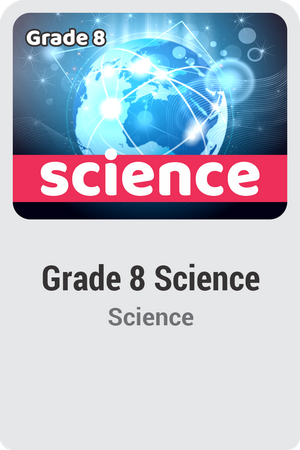
Course Overview:
Grade 8 Science (Middle School Comprehensive Science 3) is the third in a series of three consecutive middle school science classes. It builds on concepts introduced in the first and second courses of the series (Grade 6 Science, Grade 7 Science), including the disciplines of life science, physical science, and earth-space science. In addition, technology, engineering, and mathematics (STEM) concepts are integrated throughout the course. Students learn about properties of matter, physical and chemical changes, atoms and the periodic table of elements, photosynthesis and cellular respiration, the universe, and the solar system. Hands-on and virtual laboratory investigations are included throughout the course to provide students opportunities for exploration through scientific inquiry, research, measurement, problem solving, and experimental procedures. By the end of the course, students will be practicing, experimenting, thinking, and talking like a scientist!
Prerequisites:
Grade 7 Science
Required Materials:
Other Resources
Students need to supply the following materials to complete the coursework.
Segment 01
02.03 Conservation of Mass
- Measuring cup
- 1 cup of sugar
- 1 small cooking pot
- Heat source (stove)
- Kitchen scale to measure weight
- Protective cooking gloves
- 2 mixing spoons
- Adult supervision
02.04 Thermal Energy and Chemical Change
- Measuring cup
- Thermometer
- Kitchen scale to measure weight
- Protective gloves
- 2 mixing spoons
- Water (room temperature)
- 2 large Styrofoam cups
- Container or glass
- Lemonade drink mix packet with citric acid
- Baking soda
- Active yeast
- Cup for mixing yeast
- Hydrogen peroxide
- Adult supervision
Segment 02
06.02 Exploring the Solar System
- Five pounds of dry ice, finely crushed
- Insulated container to hold the dry ice
- Thick gloves
- Rubber mallet
- Safety goggles
- Plastic bowl
- Large towel to protect your work area
- Several 12-gallon garbage bags
- Flat tray
- Liter of water
- 2 cups of dirt
- 1 tablespoon of starch
- 1 tablespoon of dark syrup or soda
- 1 tablespoon of vinegar
- 1 tablespoon of rubbing alcohol
- Hairdryer
- Flashlight
- Adult supervision
06.03 Seasons and Tides
- Thermometer or color-changing temperature strip
- Protractor (or print-out of a protractor)
- Large flashlight or table lamp (Cell phone flashlights or energy-efficient bulbs will not work for this activity.)
- Adult supervision
School-Supplied Resources:
- Adobe Flash Player
- Java
- Windows Media Player
- Apple iTunes
Syllabus:
Segment 1:
Module 01: Matter
- 01.00 Module Pretest
- 01.01 Scientific Knowledge
- 01.02 Measurements of Matter
- 01.03 Volume and Density
- 01.04 Physical Properties
- 01.05 Measuring Physical Properties
Module 02: Changes in Matter
- 02.00 Module Pretest
- 02.01 States of Matter
- 02.02 Physical Versus Chemical Changes
- 02.03 Conservation of Mass
- 02.04 Thermal Energy and Chemical Change
- 02.05 Physical Models
Module 03: Elements and Compounds
- 03.00 Module Pretest
- 03.01 Atomic Theory
- 03.02 The Periodic Table
- 03.04 Compounds
- 03.05 pH and Salts
- 03.06 Mixtures and Pure Substances
Segment 2:
Module 04: Cycles and Conservation
- 04.00 Module Pretest
- 04.01 Conservation
- 04.02 Photosynthesis
- 04.03 Cellular Respiration
- 04.05 The Carbon Cycle
- 04.06 Conservation Models
Module 05: The Universe
- 05.00 Module Pretest
- 05.01 Space and Beyond
- 05.02 Galaxies
- 05.03 Stars
- 05.04 Solar Properties
- 05.06 Electromagnetic Spectrum
- 05.07 Space Technology
Module 06: Our Solar System
- 06.00 Module Pretest
- 06.01 Formation of the Solar System
- 06.02 Exploring the Solar System
- 06.03 Seasons and Tides
- 06.04 Eclipses and Moon Phases


